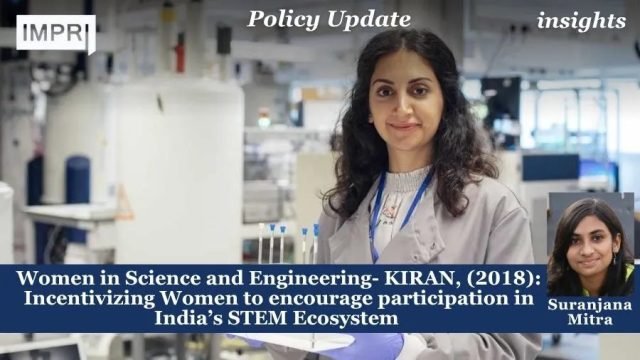Policy Update
Suranjana Mitra
Science, as a stream, for a long time has been a male-dominated domain where women have faced discrimination merely on the grounds of their gender. Even today, in medical or engineering fields, women have to face many uncomfortable situations that hinder them from achieving their full potential. Sometimes the opinions of women are overlooked and in some cases they are not even sought. Some consciously favor men whereas some do it unconsciously, similarly some do it overtly, and others, covertly.
There is also the tendency of objectifying women which can lead to sexual harassment as well. When such discrimination is rampant, women or their parents become averse to the idea of being associated with such fields in order to protect themselves or their children from experiencing extra hardships. This proves why women’s contributions in science have been overshadowed or overlooked on many occasions. Women also face a lack of opportunities, mentorship, and hostile workplaces.
Background
In order to combat such challenges, the Department of Science and Technology (DST) is implementing a comprehensive initiative, Women in Science and Engineering- KIRAN to address the problems faced by women scientists due to “break-in-career” and strengthen women’s participation in STEM (Science, Technology, Engineering and Mathematics) fields.
Jitendra Singh, Union Minister of State (Independent Charge) Science & Technology; Minister of State (Independent Charge) Earth Sciences; MoS PMO, Personnel, Public Grievances, Pensions, Atomic Energy and Space, emphasized the importance of the ‘Women Scientist Scheme’ in December, 2023. Addressing the Lok Sabha in a written response, Singh underscored the scheme’s role as a flagship program within the broader Women in Science and Engineering framework, offering vital opportunities for women scientists to forge careers in the field of science & technology (S&T).
WISE-KIRAN was launched in 2018, and aims at encouraging women to take up research in science and engineering. It focuses on societal challenges and promotes science & technology (S&T) based internships followed by opportunities of self-employment. The initiative aims to address the gender-specific challenges that often result in the exclusion of well-qualified women from S&T activities, particularly due to circumstances like career breaks associated with motherhood and family responsibilities.
Functioning
This initiative includes multiple programs that provide opportunities for women in STEM at different career stages.
The Department implemented the Women Scientist Scheme (WOS), which included three programs:
- WOS-A for research in basic and applied sciences,
- WOS-B for lab-to-land translational research for societal benefit and
- WOS-C for training in Intellectual Property Rights (IPR).
Following a third-party review, these programs have been restructured into four new initiatives under WISE-KIRAN.
- The WISE Fellowship for Ph.D. (WISE-PhD) program supports women pursuing doctoral research in basic and applied sciences.
- The WISE Post-Doctoral Fellowship (WISE-PDF), which focuses on laboratory-based research in basic and applied sciences and
- WISE-Societal Challenges with Opportunities (WISE-SCOPE) provides opportunities for women to conduct lab-based basic/applied or translational lab-to-land research, respectively, in STEM. WISE-SCOPE supports translational research with a lab-to-land aspect that addresses societal challenges.
- The WISE Internship in Independent Project Grant (WISE-IPR) program provides a one-year training opportunity in the field of Intellectual Property Rights for women aged 25- 45 belonging to basic or applied science backgrounds, with the goal of enabling self-employment opportunities in this sector.
- DST is also implementing the WIDUSHI program (Women’s Instinct for Developing and Ushering in Scientific Heights & Innovations), which supports senior women scientists in two categories: retired women scientists and women scientists who are not in regular employment. This program allows them to continue contributing to scientific advancements.
- WINGS Program provides overseas opportunities by enabling Indian women to undertake research in different areas internationally.
There are 3 Modules in the WINGS Programme:
A. Module I: WINGS Internship
B. Module II: WINGS Fellowship
C. Module III: WINGS for Scientific Visit
In the FY 2023-24, the budget allocated for the WISE-KIRAN scheme was Rs. 131.20 crore. Further, the Department of Biotechnology, Ministry of Science & Technology, Govt. of India had initiated a special scheme “Biotechnology Career Advancement and Re-orientation (BioCARe)” in the year 2011 with the aim to enhance participation of women scientists in India towards research in Biotechnology and allied areas.
It provides a unique opportunity to the unemployed women researchers/ scientists or those not working in regular positions up to the age of 55 years and having a qualification of Ph.D.in any discipline of Life Sciences or allied areas/interdisciplinary sciences/ MD/ MDS/ M.V.Sc. (Category-I) or M.Tech. in Biotechnology or in allied areas/M. Pharma degree holders (Category-II). Women researchers/ scientists supported under BioCARe Scheme are being supported with a Research Grant up to Rs. 40.00- Rs.60.00 lakh for a period of 3 years to carry out their research endeavours in Indian universities, research institutions and laboratories which also includes consolidated monthly fellowship of Rs. 75,000/- (for Category-I) and Rs. 85,000/- (for Category-II).
Impact
In a press release in February 2024, Dr Jitendra Singh, the Union Minister of State, (Independent Charge) Science & Technology, mentioned that women are leading prestigious science projects like Aditya L1 mission, Chandrayaan-3, etc. Replying to a Starred Question in the Lok Sabha, the Minister said, women have started assuming leadership roles in science projects. Cutting-edge Space Research programmes like the Chandrayaan-3 and Aditya-L1 solar mission have women scientists in leading positions, including Project Director. He further informed the House that women now constitute 43% enrolment in STEMM (Science, Technology, Engineering, Mathematics & Medicine) streams at Higher Education level, who are in the next few years expected to take up professional scientific roles.
Since the inception of the WISE-KIRAN scheme, 1962 women scientists have benefited from the Women Scientist Scheme. As many as 2,153 women scientists have benefited under the WISE-KIRAN Scheme in the last five years and the current year.
Emerging issues
WISE-KIRAN consists of many such schemes and programs that have helped women of all ages with their studies in Science and Technology. Encouraging women to take up such subjects helps the country in bridging the gap between men and women. Science and innovation have taken centre stage in the world, and India is competing with leading tech countries like the US, China, Japan and others, matching their enthusiasm and knowledge.
There are still some issues that women face:
- In rural areas, there is still a lack of awareness among people about modern medicine and treatments. Evidently, in these areas, very few show interest in pursuing modern medicine. Sociocultural norms often encourage male participation in STEM disciplines due to a biased outlook but women are often discouraged from taking up science subjects due to the downplaying of women’s capabilities, misconceptions about the stream, limited access to technology, lack of knowledge on the subjects and so on.
- Women are still discriminated against on the grounds of their gender by men who try to diminish the role of women and their contribution in these areas. As mentioned earlier, mentorship can be challenging for women as male candidates may be preferred more. Women also have to surpass their colleagues and be extraordinary to get recognition from their superiors. There are still places where such practices are rampant.
- There have been instances where women doctors have faced sexual harassment in their workplaces. In hospitals, nurses and doctors have to work night shifts, and many of these hospitals lack basic hygiene and safety protocols. These issues need to be properly addressed in order to bring proper equality among men and women.
- It is also necessary to ensure that parents do not pressurise children against their will to take up such subjects that do not align with their interests. Sometimes, parents may burden their children to pursue science subjects for better career options but putting such pressure can result in negative outcomes and loss of interest.
Way Forward
The schemes and programs under WISE-KIRAN help in bringing them closer to achieving their dreams.
- Spreading awareness: awareness drives are needed to encourage people in taking initiatives like positive conditioning of children from a young age so that their interest in science and technology can grow from an early stage. Modern education has made the interaction between multiple disciplines possible. Scientific methodologies can be used in humanities subjects and vice versa to innovate new disciplines and approaches.
- Policy implementation: while policies put forward the much needed incentives, on-ground implementation at times take a hit due to various reasons, such as stereotypes, beliefs and so on.
- Role models: children from a young age often follow their role models. Promoting the achievements of women in STEM areas can inspire them to pursue a scientific career
- Inclusivity: workplaces need to be made more inclusive and receptive to the needs of women.
- Strong grievance mechanisms: institutions need to incorporate strong grievance mechanisms so that women can file complaints on any harassment or discriminatory action by their colleagues.
References
- WISE-KIRAN: Empowering women scientists in India. (n.d.). https://ddnews.gov.in/en/wise-kiran-empowering-women-scientists-in-india/
- Women in Science and Engineering-KIRAN (WISE-KIRAN) | Department of Science & Technology. (n.d.). https://dst.gov.in/scientific-programmes/wise-kiran
- Women are leading prestigious science projects like Aditya L1 mission, Chandrayaan3 etc, says Union S&T Minister Dr Jitendra Singh. (n.d.). https://www.pib.gov.in/PressReleasePage.aspx?PRID=2003613
- PARLIAMENT QUESTION: SUPPORT MECHANISMS FOR WOMEN SCIENTISTS FACING CAREER BREAKS. (n.d.). https://www.pib.gov.in/PressReleasePage.aspx?PRID=2113278
About the Contributor: Suranjana Mitra is a Research Intern at IMPRI and holds a postgraduate degree in Political Science. She has a strong interest in public policy analysis and policy making.
Acknowledgement: The author sincerely thanks Aasthaba Jadeja and IMPRI fellows for their valuable contribution.
Disclaimer: All views expressed in the article belong solely to the author and not necessarily to the organisation.
Read more at IMPRI:
Scheme For Residential Education For Students in High Schools in Targeted Areas (SHRESHTA)- 2022



















